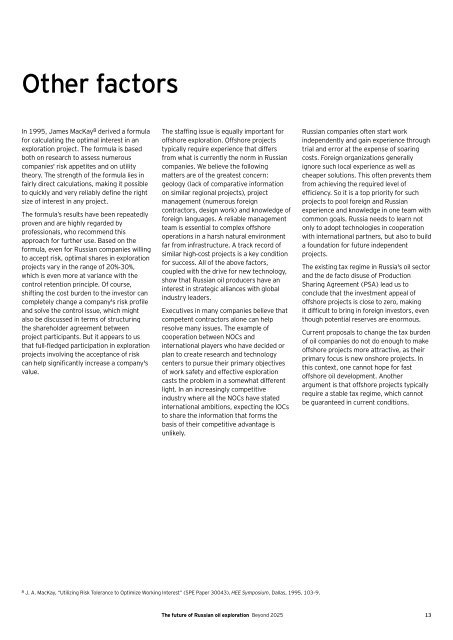The future of Russian oil exploration
The future of Russian oil exploration
The future of Russian oil exploration
You also want an ePaper? Increase the reach of your titles
YUMPU automatically turns print PDFs into web optimized ePapers that Google loves.
Other factors<br />
In 1995, James MacKay 8 derived a formula<br />
for calculating the optimal interest in an<br />
<strong>exploration</strong> project. <strong>The</strong> formula is based<br />
both on research to assess numerous<br />
companies' risk appetites and on utility<br />
theory. <strong>The</strong> strength <strong>of</strong> the formula lies in<br />
fairly direct calculations, making it possible<br />
to quickly and very reliably define the right<br />
size <strong>of</strong> interest in any project.<br />
<strong>The</strong> formula’s results have been repeatedly<br />
proven and are highly regarded by<br />
pr<strong>of</strong>essionals, who recommend this<br />
approach for further use. Based on the<br />
formula, even for <strong>Russian</strong> companies willing<br />
to accept risk, optimal shares in <strong>exploration</strong><br />
projects vary in the range <strong>of</strong> 20%-30%,<br />
which is even more at variance with the<br />
control retention principle. Of course,<br />
shifting the cost burden to the investor can<br />
completely change a company's risk pr<strong>of</strong>ile<br />
and solve the control issue, which might<br />
also be discussed in terms <strong>of</strong> structuring<br />
the shareholder agreement between<br />
project participants. But it appears to us<br />
that full-fledged participation in <strong>exploration</strong><br />
projects involving the acceptance <strong>of</strong> risk<br />
can help significantly increase a company's<br />
value.<br />
<strong>The</strong> staffing issue is equally important for<br />
<strong>of</strong>fshore <strong>exploration</strong>. Offshore projects<br />
typically require experience that differs<br />
from what is currently the norm in <strong>Russian</strong><br />
companies. We believe the following<br />
matters are <strong>of</strong> the greatest concern:<br />
geology (lack <strong>of</strong> comparative information<br />
on similar regional projects), project<br />
management (numerous foreign<br />
contractors, design work) and knowledge <strong>of</strong><br />
foreign languages. A reliable management<br />
team is essential to complex <strong>of</strong>fshore<br />
operations in a harsh natural environment<br />
far from infrastructure. A track record <strong>of</strong><br />
similar high-cost projects is a key condition<br />
for success. All <strong>of</strong> the above factors,<br />
coupled with the drive for new technology,<br />
show that <strong>Russian</strong> <strong>oil</strong> producers have an<br />
interest in strategic alliances with global<br />
industry leaders.<br />
Executives in many companies believe that<br />
competent contractors alone can help<br />
resolve many issues. <strong>The</strong> example <strong>of</strong><br />
cooperation between NOCs and<br />
international players who have decided or<br />
plan to create research and technology<br />
centers to pursue their primary objectives<br />
<strong>of</strong> work safety and effective <strong>exploration</strong><br />
casts the problem in a somewhat different<br />
light. In an increasingly competitive<br />
industry where all the NOCs have stated<br />
international ambitions, expecting the IOCs<br />
to share the information that forms the<br />
basis <strong>of</strong> their competitive advantage is<br />
unlikely.<br />
8 J. A. MacKay, “Utilizing Risk Tolerance to Optimize Working Interest” (SPE Paper 30043), HEE Symposium, Dallas, 1995, 103–9.<br />
<strong>The</strong> <strong>future</strong> <strong>of</strong> <strong>Russian</strong> <strong>oil</strong> <strong>exploration</strong> Beyond 2025<br />
<strong>Russian</strong> companies <strong>of</strong>ten start work<br />
independently and gain experience through<br />
trial and error at the expense <strong>of</strong> soaring<br />
costs. Foreign organizations generally<br />
ignore such local experience as well as<br />
cheaper solutions. This <strong>of</strong>ten prevents them<br />
from achieving the required level <strong>of</strong><br />
efficiency. So it is a top priority for such<br />
projects to pool foreign and <strong>Russian</strong><br />
experience and knowledge in one team with<br />
common goals. Russia needs to learn not<br />
only to adopt technologies in cooperation<br />
with international partners, but also to build<br />
a foundation for <strong>future</strong> independent<br />
projects.<br />
<strong>The</strong> existing tax regime in Russia's <strong>oil</strong> sector<br />
and the de facto disuse <strong>of</strong> Production<br />
Sharing Agreement (PSA) lead us to<br />
conclude that the investment appeal <strong>of</strong><br />
<strong>of</strong>fshore projects is close to zero, making<br />
it difficult to bring in foreign investors, even<br />
though potential reserves are enormous.<br />
Current proposals to change the tax burden<br />
<strong>of</strong> <strong>oil</strong> companies do not do enough to make<br />
<strong>of</strong>fshore projects more attractive, as their<br />
primary focus is new onshore projects. In<br />
this context, one cannot hope for fast<br />
<strong>of</strong>fshore <strong>oil</strong> development. Another<br />
argument is that <strong>of</strong>fshore projects typically<br />
require a stable tax regime, which cannot<br />
be guaranteed in current conditions.<br />
13


